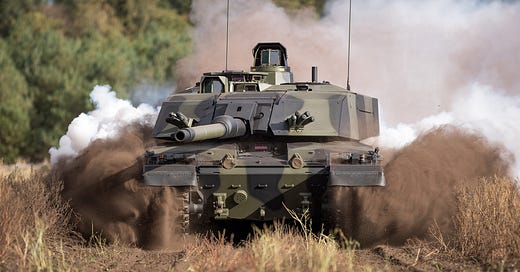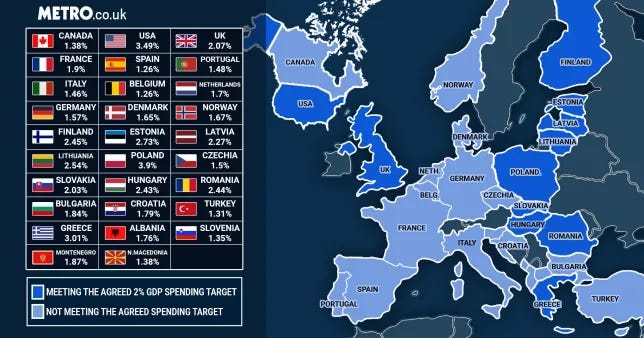I’ve recently been speaking with some German friends of mine about various news articles concerning the Russo-Ukrainian war and the USA’s general decline in interest in the NATO project in Europe.
Now it has to be remembered that we’re all people with a good understanding of history and economics and of the history of the Ukraine conflict. That doesn’t make anyone a Putin supporter, but it does mean that 30+ years of western dishonesty and trouble making in Ukraine doesn’t get a free pass either. My wife takes the traditional Polish perspective of seeing western (mostly British) support as being as much use as a chocolate teapot.
Samuel Huntington posited the idea of an ongoing Ukrainian fault line conflict in his book “Clash of Civilizations” in 1994. That hasn’t stopped various left wing commenters claiming that the war in Ukraine disproves his theory somehow - pity they didn’t read the book. The fact that Ukrainians are also Slavic, Orthodox Christians1 doesn’t make it an intra-cultural conflict when it is very transparently one between Western and Russian spheres of influence. That book was very formative for lots of elements of my view of world politics, international relations and demographics - such are the realities of someone who started an international relations degree six days after 9/112.
Whilst this war has been in its most recent phase3we have seen lots of western nations talking about re-arming. There are four main reasons this is happening;
they’ve now got a clear state as an opponent
they’ve donated all their 1970s and 80s gear to Ukraine
the USA isn’t the hegemon it was during the 1990s and is far less likely to rush in to save the day
public support in favour of increased military spending can be created through the media
Of course, that leads us to the question of what money is being spent on what armaments.
The money is often expressed as a percentage of GDP. This gives you an idea of how much money a nation is currently dedicating to defence spending, but not the absolute sum where the richer countries naturally dominate.
It’s worth remembering that NATO specifies a minimum of 2% of GDP being spent on defence per year. This is something that around two thirds of NATO members consistently fail to do, without any consequences.
The other factor that is forgotten about this is that spending compounds and is cumulative. Underinvesting by 1% per year for a decade doesn’t simply put you 10% behind. It quickly creates a lag which is all but impossible to overcome. This also all comes at a time where western economies are not doing particularly well, especially in terms of the cost of living for the average family4. This economic malaise isn’t all down to the immigration crisis5, covid or energy prices but these are all big factors.
In an ideal world, or the past, this defence spending would have some kind of Keynesian stimulus effect in the economy as tenders would be awarded to national companies who would invest money in staff and machinery allowing everyone to pull themselves up by their own proverbial bootstraps. Now we simply try to order tanks from South Korea.
Why South Korea though? Why not build our own in Europe. Essentially, we can’t. Britain is now in the third generation of modernising their main battle tanks with the upgrade to Challenger III. As far as I am aware, no new tanks are actually being made but around two thirds of the current fleet of Challenger 2s are being upgraded with the idea that the tank gains another 15-20 years of service life. The same issue seems to exist with the American M1 Abrams tank in that no “new” examples are ever built, existing and now 30 year old hulls are re-fitted and upgraded. I’ve been told that the skills to fabricate armoured vehicle hulls in numbers are few and far between and most of the men who could do it have long retired. It looks like the western world struggles to build new AFVs, and certainly not in the numbers we have seen be deployed (and lost) in Ukraine.
MOD Photo of the Challenger 3. It rings all sorts of AI alarm bells.
Added to that there’s the fact that armies need huge quantities of supplies, and ammunition isn’t available off the shelf. Europe lacks the necessary chemicals for explosives and propellants. The US had a monthly output of 155mm shells roughly equal to two day’s usage in the Ukrainian army and although production rates have improved and Europe approaches its goal of producing 2 million a year. That of course requires a skilled workforce, quality steel, a chemicals industry, finances and political will.
This leads me on to one of the things I think is most worrying for long term defence policies across the West - western states can no longer tell friend from foe. This is particularly keen when the question of the US (and their British allies tagging along desperately) standing up to China in the Pacific. Can you imagine an embargo on Chinese made products? A ban on workers of Chinese heritage in key industries? Any form of screening or checking being put in place along the lines of heritage, race or nationality? All of these things are pretty much beyond western nations as they are today - the British universities which once enjoyed globally high repute are now essentially dependent on the money brought in by large numbers of Chinese students.
The dilemma of Chinese nationals and people of Chinese origin in conflict with China echoes the problem faced with Japanese-Americans in WW2.
With Russia the problem may be less stark, but it’s certainly still there. We’ve already seen attempts in most nations to smear all right wing parties with the idea that they are beholden to Putin - be it interfering in Brexit, the spurious Russian dossier in 2016, Russian influence in Moldova or Hungary, of the German AfD. I’ve even seen the staunchly Russophobic PiS party in Poland6 accused of being pro-Putin because of their nationalist seeming policies. It looks like we have governments far keener on conducting an internal witch hunt against potential nationalists than taking any longer term defence precautions.
When all of this is taken into account it looks very much like any European re-armament is little more than the creation of paper tigers. It would require skills we don’t have, in industries we’ve long sidelined, using resources we don’t have and paid for out of a budget which is already spent up a generation in advance. That’s without getting in to the dilemma of who’d actually serve in any armed force7.
We live in twilight
The sun is setting on our west.
Await its red dawning.
The Ukrainian Orthodox church is a complex and much divided organisation now. I can’t track all the parts easily. There’s a distinctly pro-Western branch/division and it all becomes rather complex. They’ve even moved to a western calendar and no longer celebrate Christmas on the 6th January.
Really. It put quite a spin on the whole thing.
2022 when the Russian invasion got western media attention rather than the 8 years of lower intensity war before that
Relying on cheap gas from Russia whilst not following pro-Russian policies seems to have been particularly silly.
You have to hunt hard to find how expensive immigration is for countries, when you find data it tends to be shocking. Denmark is one of the few nations to make it accessible.
I wrote about the myth of “Based Poland” and how it’s largely a creation of the Anglophone internet here
Polish Politics - It's not what you think.
As a Polonophile and someone who lived in Poland for a decade, seeing Tusk’s globalist government go “mask off” and abandon any principle of the “rule of law” they bleated on about for years is very sad.
I wrote about the farce that was Conservative politicians speaking in favour of conscription during their disastrous election campaign
Conscription in Britain? Don't Make Me Laugh
To start with we need to look at the numbers in the British armed services.









Well done. What a complete failure of government to rely on foreign nations for vital manufacturing and supplies for manufacturing. It’s one of the few things they should be doing instead of the thousand stupid things they are doing.
I enjoyed that a lot.
One thought. In the US the floodgate is very thin. Once a subject gets aired for the first time, it's open season from there. Think of "defund the police" - who ever thought of such a load of bollocks? Yet we're still hearing it. Europe, it has been said: pay more or pay for it all. It's only a matter of time before the US Government runs through all the other terrible options and tells Europe to pay what is demanded / required or the US leaves NATO. Do we really think there will be a nuclear holocaust if Europe gets attacked? Probably, perhaps maybe, now. In six years?
What would / could the Europeans do?